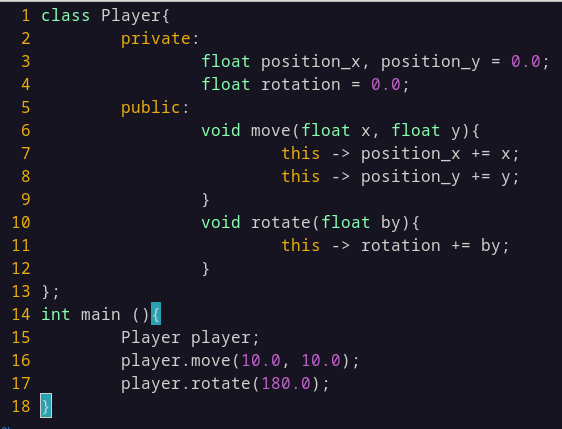I lived in a perfect OOP bubble for my entire life. Everything was peaceful and it worked perfectly. When I wanted to move that player, I do player.move(10.0, 0.0); When I want to collect a coin, I go GameMan -> collect_coin(); And when I really need a global method, so be it. I love my C++, I love my python and yes, I also love my GDScript (Godot Game Engine). They all work with classes and objects and it all works perfectly for me.
But oh no! I wanted to learn Rust recently and I really liked how values are non-mutable by defualt and such, but it doesn't have classes!? What's going on? How do you even move a player? Do you just HAVE to have a global method for everything? like
move_player();
rotate_player();
player_collect_coin();
But no! Even worse! How do you even know which player is meant? Do you just HAVE to pass the player (which is a struct probably) like this?
move(player);
rotate(player);
collect_coin(player, coin);
I do not want to live in a world where everything has to be global! I want my data to be organized and to be able to call my methods WHERE I need them, not where they just lie there, waiting to be used in the global scope.
So please, dear C, Rust and... other non OOP language users! Tell me, what makes you stay with these languages? And what is that coding style even called? Is that the "pure functional style" I heard about some time?
Also what text editor do you use (non judgemental)? Vim user here

You know, I'd been meaning to try out functional programming languages one of these days, but you've just about cured it. That's horrifying.
If you're used to it, it works fine. The thing is that everything is immutable, so having tons of copies doesn't matter in terms of incorrect state between threads (just don't actively hold onto old copies).
Performance certainly does suffer to some degree, but that's single-core performance. Where FP really shines is that you can very easily parallelize everything.
Not as “horrifying” as you make it sound. However, it does rely quite a bit on compiler optimizations. Haskell uses this approach a lot: Rust, however, very rarely does.